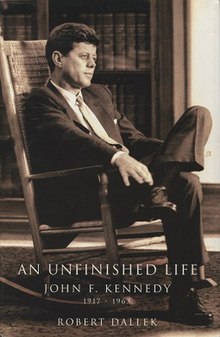An Unfinished Life: John F. Kennedy, 1917–1963
An Unfinished Life: John F. Kennedy, 1917–1963 is a biography of the 35th president of the United States, John F. Kennedy (JFK), who was assassinated in 1963. It was written by Bancroft Prize-winning historian Robert Dallek, a professor at Boston University. Robert Dallek researched JFK for five years, using National Security Archives, oral histories, White House tapes, and medical records in his preparations.[1] Dallek contends that historians have underestimated JFK's achievements, especially with foreign policy.[1]
 First edition | |
| Author | Robert Dallek |
|---|---|
| Subject | Assassination of John F. Kennedy |
| Genre | Biography |
| Publisher | Little, Brown |
Publication date | 2003 |
| Pages | 838 |
| ISBN | 9780713998030 |
JFK was part of a prominent Boston family. The death of JFK's older brother Joseph P. Kennedy, Jr. during World War II eventually paved the way for his political career. His wealthy diplomat father Joseph P. Kennedy was involved in his political career. In the mid-1950s, after defeating Henry Cabot Lodge Jr. and leaving the United States House of Representatives and getting elected as a U.S. Senator, he was one step closer to becoming president.[2]
Dallek recounted Kennedy's medical problems which were controlled by drugs including antispasmodics and antibiotics. He used painkillers for his chronic back pain and other medication to treat his Addison's disease.[1] He sometimes took up to eight medications a day. A committee of three Kennedy associates refused to give people his medical records for decades, but they decided to give Dallek access to them; although the book does not have a complete record of his medical history.[3]
Earlier books
The Independent in its assessment has stated that earlier works about Kennedy were unimpressive.[4] Many of the books written since JFK's assassination were written to debunk him, especially for his womanizing.[1] There are also books that include hagiography, vendetta, gossip, acuity, sympathy and scholarly detachment.
Reception
A review in The Independent says, "One recalls a Thomas Jefferson letter to John Adams in 1813, agreeing 'that there is a natural aristocracy among men. The grounds of this are virtue and talents.... There is also an artificial aristocracy founded on wealth and birth, without either virtue or talents.' This book, in my view, puts John Kennedy somewhere in between."[4]
References
- Page, Susan (13 May 2003). "'Unfinished Life' revisits Kennedy's appeal". USA Today. Gannett Co. Inc. Retrieved 21 January 2009.
- Exum, David (24 January 2011). "An Unfinished Life: John F. Kennedy, 1917-1963". Book Reporter. Retrieved 21 January 2009.
- Altman, Lawrence K.; Purdum, Todd S. (17 November 2002). "In J.F.K. File, Hidden Illness, Pain and Pills". The New York Times. The New York Times Company. Retrieved 21 January 2009.
- "John F Kennedy: An Unfinished Life 1917–1963 By Robert Dallek". The Independent. London: Independent News and Media Limited. 31 August 2003. Archived from the original on 4 February 2009. Retrieved 21 January 2009.